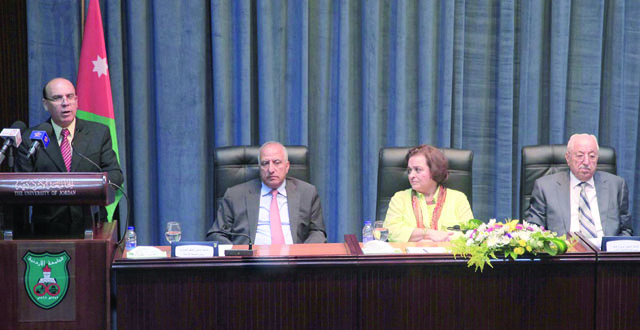AMMAN — School curricula should be modified to utilise technological advancements in enhancing creativity and self-learning, academics said at a conference on Tuesday.
Participants at the third Arab Conference for Research on Talent and Excellence, inaugurated by HRH Princess Alia, are discussing the effect of technology on education.
The two-day conference, organised by the Global Foundation for Youth, Environment and Development in cooperation with the Arab Network for Open and Distance Education and UJ, features research papers from Jordan, Saudi Arabia, Bahrain, Sudan, Iraq and Germany.
Adnan Toubasi, the president of the foundation, said school curricula should promote flexibility and understanding of others.
“Our foundation believes that our school students must develop creative minds and productive personalities,” he said at the opening session, highlighting the need to help students build a balanced culture and develop their self-learning ability.
“Teachers bear the responsibility of helping students think and generate ideas,” Toubasi noted, adding that teachers are the ones to motivate students and direct them to sources of knowledge, in addition to their role in connecting theoretical information to everyday life.
Commenting on this year’s General Secondary Certificate Examination (Tawjihi), he said the results revealed a clear defect in the educational process in a way that shocked everyone in the country, urging the Education Ministry to investigate points of weakness.
Forty per cent, or 22,974 students, of the 57,141 who sat for the Tawjihi summer session passed, compared with a pass ratio of 56.3 per cent registered last year, according to official figures.
Toubasi also highlighted the role of parents in following up on their children’s academic performance.
He noted that developing school curricula requires “higher political decisions” that allow the creation of an independent body to draw up and apply an education plan that is not affected by the change of education ministers.
“Our school curricula must subscribe to international standards and give more attention to deduction,” he told the audience, adding that courses should have a role in building the national identity and promoting problem solving skills.
President of the Royal Consultative Committee for Education Marwan Kamal agreed.
“The educational process is cumulative; therefore, there must be a plan that all education ministers build on, without having to start from scratch,” he said at the conference, held at the University of Jordan (UJ).
Kamal, who chairs the conference’s preparatory committee, highlighted the absence of the themes of awareness and nationalism from curricula, calling for a shift from traditional curricula loaded with theoretical information to courses that allow gaining and exchanging practical knowledge.
UJ President Ekhleif Tarawneh noted that the use of new technologies created a demand for a parallel development and review of curricula, which should promote tolerance and dialogue, in addition to spreading the culture of empowering women and preserving society’s cultural identity.
Tarawneh added that the revamped curricula must eliminate students’ dependence on memorisation and spoon feeding, stressing the importance of developing analytical and creative thinking skills.
He added that effective education at schools will positively affect the level of students at universities.
